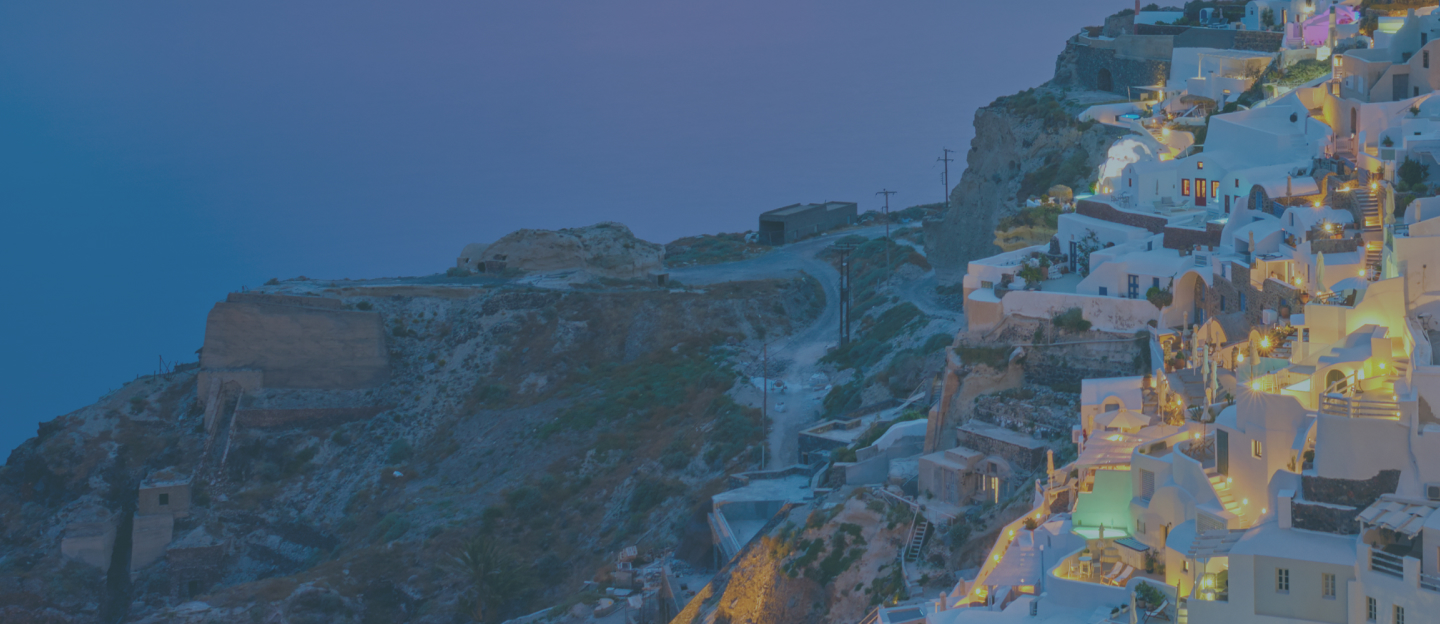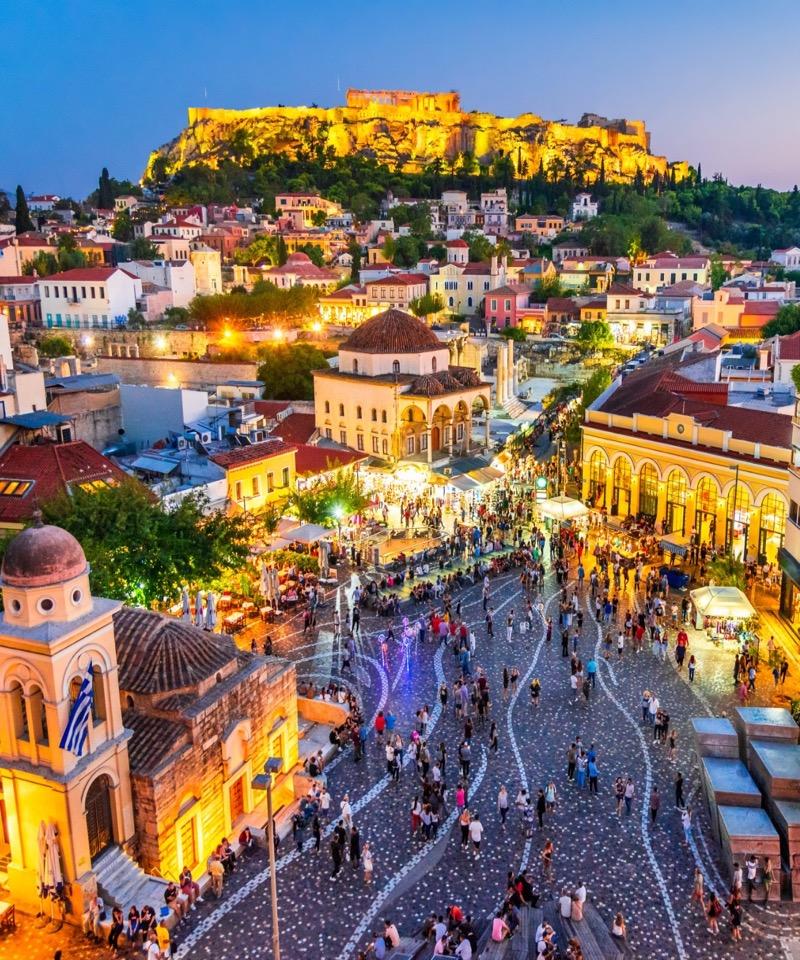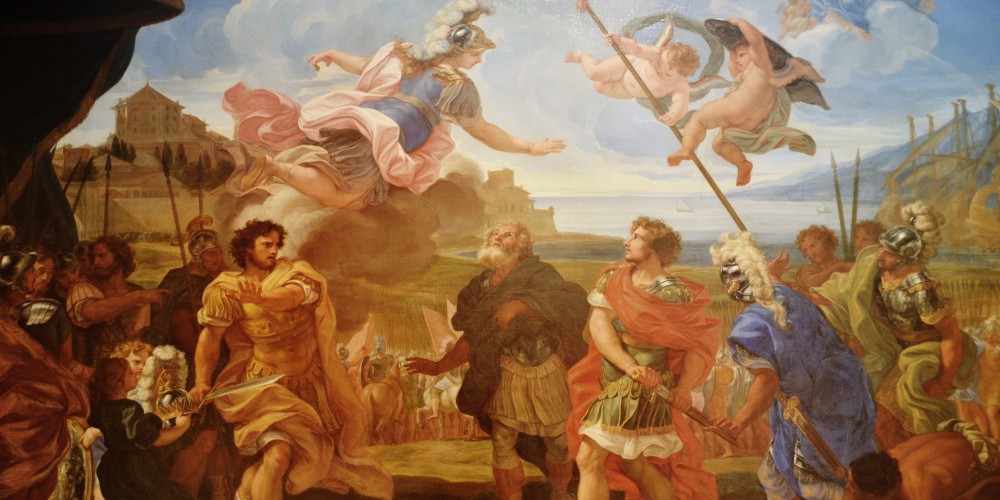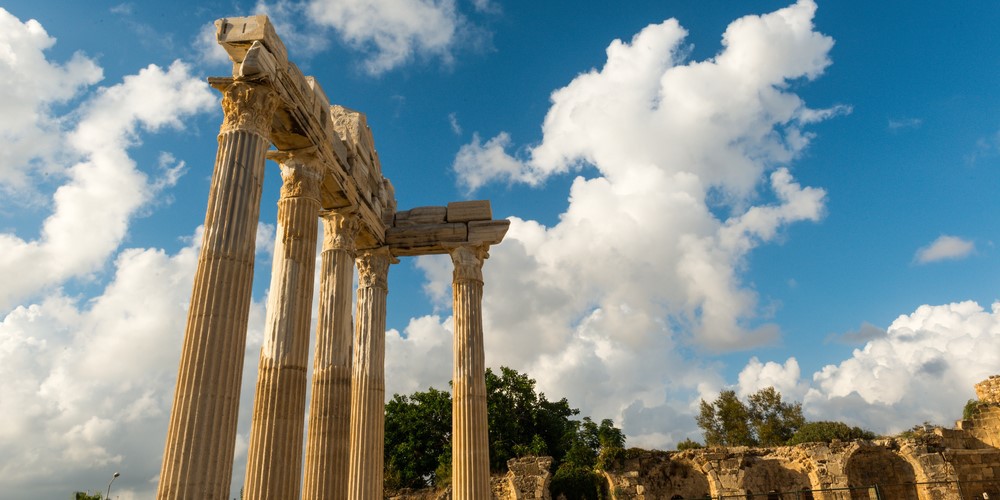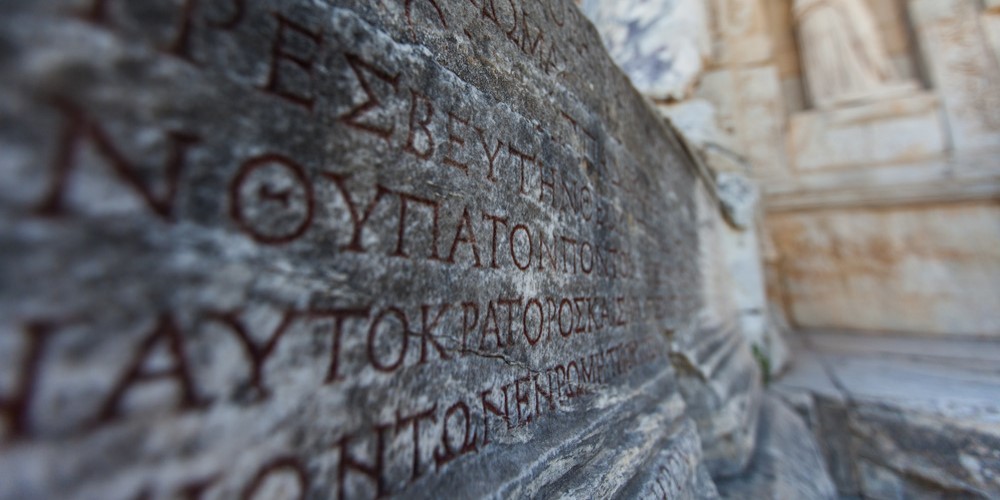
The Faces of Modern Greek Literature
Key Takeaways
- Greek culture's vast heritage has left a significant impact on the world, extending beyond science and language to include literature and the arts.
- Modern Greek literature boasts influential writers like Constantine P. Cavafy, Odysseas Elytis, Alexandros Papadiamantis, and Giorgos Seferis, whose works have left a lasting mark on poetry.
- Despite facing personal struggles like exile and persecution, these writers' poetry continues to resonate with readers worldwide.
- Themes of love, loss, historical events, social inequality, and the human experience feature prominently in Greek literature, carrying on the tradition of storytelling that has persisted for centuries.
There is little chance you haven’t heard about the beauty and vastness of Greek culture and the heritage it has given to the rest of the world.
Its offer is not limited only to the level of science or language culture, but also to the field of arts, focusing on literature. Hundreds of writers born here have made a name for themselves, and their books have been read worldwide. Some of them have even been honored with the well-known Nobel Prize in Literature, and many more have been nominated for the prize.
Let's take a look at the most important modern Greek writers and poets, the faces of modern Greek Literature.
Constantine P. Cavafy
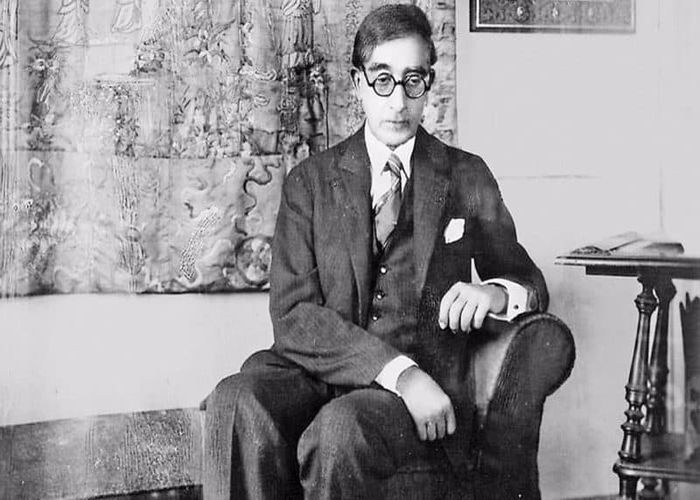
Konstantinos Cavafy was a Greek poet, who is considered one of the most important poets of modern times.
He was born and lived in Alexandria, which is why he is often referred to as "the Alexandrian". He published poems, while dozens remained as drafts. He created his most important works after 40 years.
Today, his poetry has not only prevailed in Greece, but also occupied a prominent place in all European poetry, after the translations of his poems first into French, English, and German, and then into many other languages.
The body of Cavafy poems includes the 154 poems that he recognized, his 37 Denied poems, most of them youthful, in a romantic purgatory, which he later renounced, the Hidden, that are 75 poems that were found finished on paper of him, as well as the 30 Imperfect, which were found on his papers without having taken their final form.
He traveled for the first time in Greece in 1901 and in Athens with Grigorios Xenopoulos and Ioannis Polemis. In 1904, he published a small collection entitled ‘Poems’. The collection, in 100-200 copies, was released privately.
In 1910, he reprinted his collection, adding seven more poems. He wrote the poem Ithaca in 1911 and in 1914 he met the author Edward Morgan Forster and became friendly with him. His last recognized poem is In the outskirts of Antioch published in 1933 and the first The Walls in 1897.
In 1935, the first complete edition of his 154 poems was published in Alexandria, which was immediately sold out. The second edition was made in 1948 in Greece by Ikaros Publications.
Dividing his poetic work into philosophical, historical, and hedonistic, his poems capture the erotic element, his philosophical thought, and his historical knowledge. The language and lyrical form of Cavafy's poems were idiosyncratic and pioneering for the time.
Cavafy expressed himself mainly through symbols. His art is a collection of archetypes, which give a fleeting allusive meaning to his speech. It draws memories from the past and places them in the present, sometimes as a warning for the future.
Such was his relationship with the collective soul and its contents, that he is considered a precursor to the relationship of 20th-century literature with the collective consciousness.
Odysseas Elytis
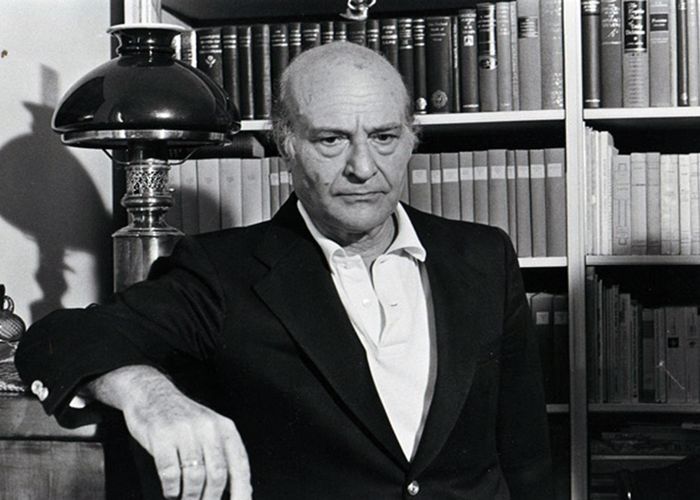
Awarded the Nobel Prize in Literature, Odysseas Elytis -born Odysseas Alepoudelis- was one of the most important Greek poets, who praised the Greek tradition and love.
Odysseas Elytis was born on November 2, 1911 in Heraklion, Crete. He was the last of the six children. In 1914 his father moved his factories to Piraeus and the family settled in Athens. Odysseas Elytis enrolled in 1917 in a private school, where he studied for seven years.
He spent the first summers of his life in Crete, Lesvos, and Spetses. In November 1920, after the fall of politician Eleftherios Venizelos, his family was persecuted for their adherence to Venizelos' ideas. Venizelos himself had close relations with the family of Elytis and was often hosted at his home on the estate of Aklidi.
The culmination of the persecution experienced by his family was the arrest of his father. In 1923 he traveled with his family to Europe, visiting Italy, Switzerland, Germany, and Yugoslavia. In Lausanne, the poet had the opportunity to meet the exile after the fall of Eleftherios Venizelos.
In the autumn of 1924 he enrolled in the 3rd High School for Boys in Athens and collaborated in the magazine ‘I Diaplasis ton Paidon’, using various pseudonyms. That’s when he first became acquainted with modern Greek literature and spent all his money buying books and magazines.
He gave up his intention to study chemistry and in 1930 he enrolled in the Law School of Athens. When the "Ideocratic Philosophical Group" was founded at the University in 1933, with the participation of Konstantinos Tsatsos, Panagiotis Kanellopoulos, Ioannis Theodorakopoulos, and Ioannis Sykoutris, Elytis was one of the representatives of the students.
At the same time, he studied the contemporary Greek poetry of Caesar Emmanuel, the collection ‘Sto Glitomou to Hazi’ by Theodoros Dorros, the ‘Strofi’ by George Seferis, and the ‘Poems’ by Nikitas Randos.
At the same time, he became more closely associated with George Sarantaris, who encouraged him when Elytis was still hesitant about whether he should publish his works, while he also brought him in contact with the circle of New Letters magazine.
This magazine, edited by Andreas Karantonis and collaborators of old and new notable Greek writers brought to Greece contemporary artists and introduced to the reading public mainly the younger poets, with the translation of their representative works or with articles informative about their poetry.
It became the spiritual instrument of the generation of the '30s that hosted in its columns all the modernist elements, judging favorably and promoting the creations of the young Greek poets.
Alexandros Papadiamantis
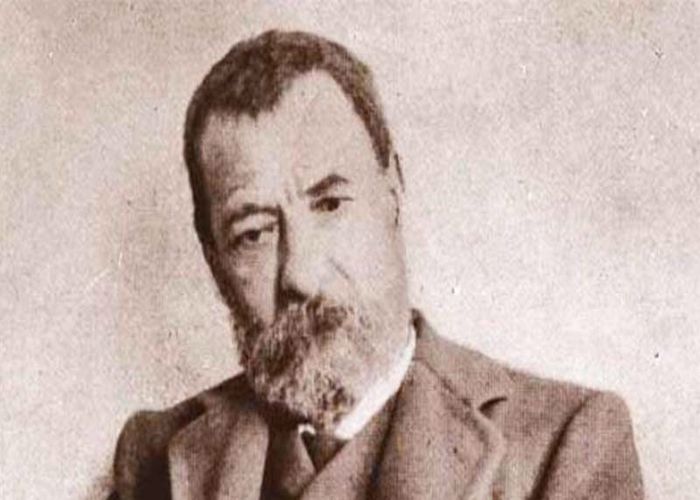
Alexandros Papadiamantis was born in 1851 in Skiathos; he was the third of six children. Sensitive and unruly as a child, he wandered from school to school and finally graduated in 1874.
For a few months, he stayed with his cousin, Timos Moraitidis, on Mount Athos and then enrolled in the Faculty of Philosophy of the University of Athens, but he was discredited to complete his studies. From 1887 he settled permanently in Athens. From time to time he visited his particular homeland, where he died of pneumonia in 1911.
Papadiamantis lived in Athens in the transitional period of political and social changes and the development of the press, which gave rise to a new type of scholar and renewed the writers' relationship with the public.
The relationship between the daily newspaper and literature, which encouraged the production of works by semi-industrial methods -such as the pamphlet novel- or the cultivation of literary genres such as short stories and vignettes, coincides with the expansion of the reading public resulting from the expansion of education. The writers were freed from the power of the patron but ironically submitted to the laws of the market.
Papadiamantis began his career as a writer, entering the field of novels later, before entering the field of short stories in newspapers and magazines. He never used his tenure in translation and journalism to promote his work, nor did he have the entrepreneurship and regularity of a professional writer, while he valued both his original and his translation work lower than what his employers offered him.
After all, he never chose the role of author of institutions and distinctions. He did not take part in competitions, he did not seek the protection of his former colleagues, he did not dedicate himself to any of his novels or short stories, he tried, but he probably did not have the time and ability to publish a book, he did not claim prizes, and did not change strategies to construct his literary status.
Papadiamantis began his writing career with adventurous historical novels, but in time he turned to realism, where he excelled. The decisive factor for the turn, was the need of the author, who felt trapped in the suffocating urban life of Athens, to rediscover the paradise of his childhood, to seek through lyrical flashbacks the lost time of innocence.
He described the small society of his island, as he remembered it in the city, and most of the time imperceptibly contrasted the simple rural world of the text with the urban and "Europeanized" world of the reader.
From the exuberant production of Papadiamantis, we must exclude many short stories that barely reach or exceed the average. If not the most representative, nevertheless the strongest and most popular of Papadiamantis’ works is ‘The Fonissa’ -or ‘The Female Killer’ in English- that was written in 1903.
The central figure in this great narrative is a woman; sixty years old now, as she reflects on her past, she finds that the woman is always a slave: of her parents, unmarried, of her husband, married, after the children and finally of her children's children. So he conceives the idea of killing the little girls, to save them from suffering. And with this obsession, she will commit a series of murders, and being chased by the police she will drown while seeking refuge in a church near the sea, of the road between divine and human justice ".
Despite its obvious flaws, which have caused a lot of critics to frown upon Papadiamantis' work. It does not cease to exert a peculiar charm on us.
Nikos Kazantzakis
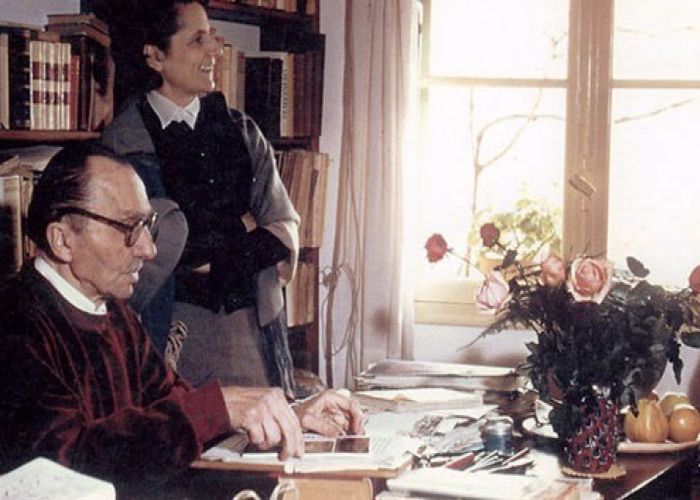
Nikos Kazantzakis was born in Heraklion in Turkish-occupied Crete. He studied law in Athens, and postgraduate studies in Paris, where he was deeply influenced by the philosophical principles of Bergson and Nietzsche.
It is at this time that his systematic preoccupation with letters begins. He made numerous trips abroad, several times as a newspaper correspondent. He served as director-general in the Ministry of Health, was appointed Minister without Portfolio, and worked as a literary advisor to UNESCO. He was president of the Society of Greek Writers. In 1956, he was awarded the Peace Prize and was nominated for the Nobel Prize in Literature nine times.
He considered himself primarily a poet, having written ‘The Odyssey’, ambitious work with 24 rhymes and 33,333 verses. He distinguished himself in dramaturgy, in the writing of travel impressions, and in philosophical essays.
Regardless, he became better known from his novels. His work has been translated and published in more than 50 countries and has been adapted for theater, film, radio, and television.
Apart from Greek, Nikos Kazantzakis knew six other languages: English, French, German, Italian, Spanish, and Russian. He also translated works from ancient Greek.
The church had a vicious reaction against Nikos Kazantzakis and his books. The "Last Temptation" was added in 1954 to the List of Forbidden Books of the Roman Catholic Church, the now-defunct Index Librorum Prohibitorum.
In 1954, responding to the threats of the Church, Kazatzakis had written in a letter: "You have given me a curse, Holy Fathers, I give you a wish: I wish you that your conscience is as pure as mine and that you are so moral and religious as I am ".
Eventually, the Church of Greece did not dare to absolve Nikos Kazantzakis, as the Ecumenical Patriarch Athenagoras was opposed to such a thing.
Nikos Kazantzakis died on October 26, 1957, at the age of 74. His body was transported to Athens, but the Church of Greece refused to exhibit it. His compatriots honored him especially and buried him in a bastion of the Venetian walls of Heraklion. On his grave, the inscription was engraved, as he wished: "I hope for nothing. I'm not afraid of anything. I am free".
Giorgos Seferis
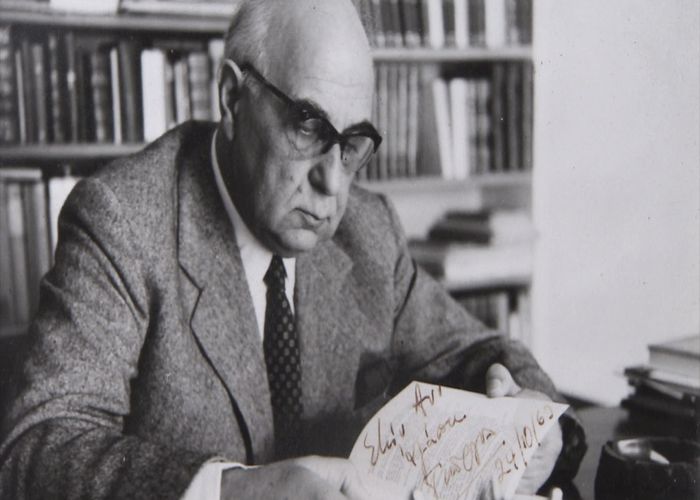
George Seferis was a Greek diplomat and poet and the first Greek to be awarded the Nobel Prize in Literature. He is one of the most important Greek poets and one of the two unique Greeks awarded the Nobel Prize in Literature, along with Odysseus Elytis.
He was born on March 13, 1900, in Vourla, Turkey. In 1914, a time when he began to write his first lyrics, with the outbreak of the Great War during the summer period of the year, the family emigrated to Greece.
He graduated from the Model Classical High School of Athens in May 1917. A year later he went to Paris and enrolled in the Law School of the Sorbonne University, from which he graduated with a doctorate in 1924.
George Seferis appears in Greek letters in 1931 with the poetry collection "Strofi" which provoked positive and negative reactions in the literary community because it becomes apparent its differentiation from the poetry of the generation of 1920.
After "Sterna" (1932) he established himself with his poetry collection "Novel" (1935). The influence he received from the pure poetry of Paul Valery and the modernism of Thomas Sterns Eliot can be distinguished.
In 1963, he was awarded the Nobel Prize in Literature by the Royal Swedish Academy of Sciences.
On April 16, 1964, he was awarded an honorary doctorate by the University of Thessaloniki, while in the summer of the same year he was awarded an honorary doctorate by the University of Oxford and in June 1965 an honorary doctorate by Princeton.
On March 28, 1969, George Seferis spoke publicly for the first time against the junta, and for this reason, he was deprived of the title of honorary ambassador, as well as the right to use a diplomatic passport.
He died on September 20, 1971, and two days after his funeral, he took a silent stand against the dictatorship.
Seferis' language is dense and crucial, it condenses in his poetry what he epigrammatically called "the misery of Romanism". The living, indigenous tradition goes hand in hand with modern European education.
In his face, in his poetic, essay, and translation work, modern Greek literature recognizes one of the classics of the 20th century.
Dido Sotiriou
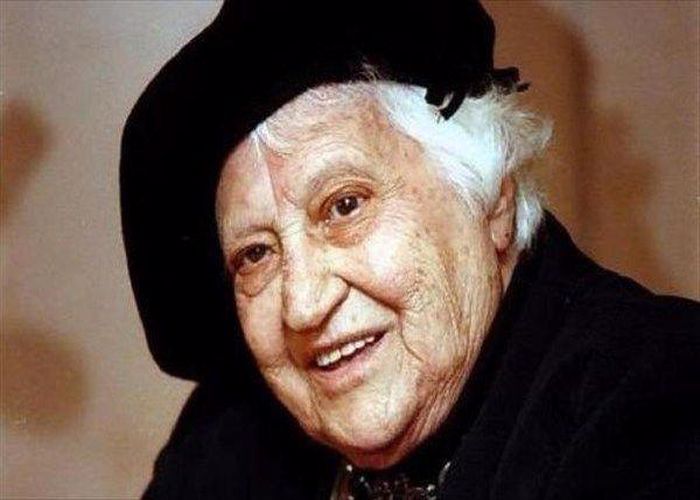
Dido Sotiriou was a novelist and journalist. She was born in Aidini, Asia Minor. In 1919, she settled with her family in Smyrna and after the disaster of 1922, they fled to Greece.
In Athens, she completed her circular studies with teachers including the writers Costas Paroritis and Sofia Mavroidi-Papadaki. She studied at the French Institute in Athens and in 1937 attended French literature for a few months at Sorbonne University.
From 1936, she turned professionally to journalism. She collaborated with the magazine "Woman" as editor-in-chief, and the newspapers "Neos Kosmos" and "Rizospastis" in the same role, while during the German occupation she collaborated with Melpo Axioti, Elli Alexiou, Elli Pappa, Titika Damaski, Electra Apostolou, Chryssa Hadjivassiliou and other Greek women of the resistance.
She took part in the League of Nations conference in Geneva in 1935, where she met Lenin's partner Alexandra Kolodai and in the founding congress of the Democratic Women's Federation in 1945 in Paris.
She first appeared in literature in 1959, with the publication of the novel "The Dead Are Waiting". Her works have been translated into many foreign languages. Part of her work has been successful abroad, especially in Turkey. Dido Sotiriou belongs to the Greek novelists of the interwar period.
Her work moves in the context of realism with a strong presence of the autobiographical element and the emotional participation of the author in the adventures of her heroes and draws its theme from the Asia Minor catastrophe, the period of civil war, and the post-civil period of Greek history.
With "Matomena Chomata" Sotiriou inaugurated her path towards writing that combines the novel technique with a perspective of examining her subjects from a historical point of view, a course that continued in her next two novels "Mandoli", on the subject of the Belogianni case. and "Demolition".
She was awarded the Abdi Ipekci Prize for Greek-Turkish Friendship in 1983, the Special State Prize for Literature in 1989, the Prize of the Academy of Athens in 1990, and the Brigadier General of the Order of the Phoenix in 1995.
In 2001, the Society was established in her honor the "Dido Sotiriou" award, which is given "to a foreign or Greek author who with his writing highlights the communication of peoples and cultures through cultural diversity".
She died in Athens on September 23, 2004.
Giannis Ritsos
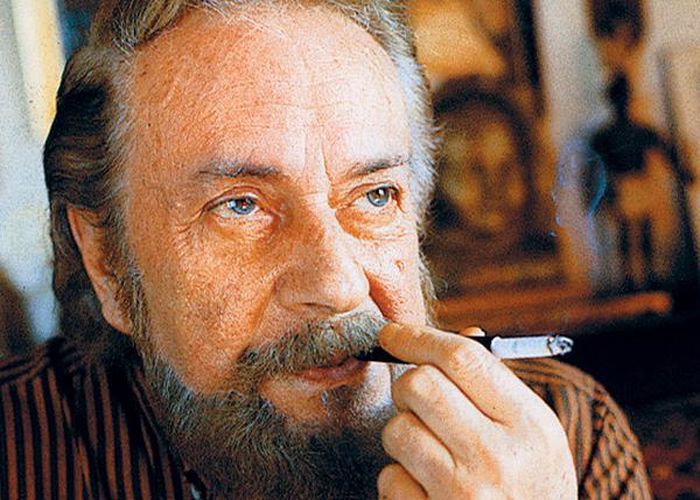
He was born in Monemvasia on May Day 1909. His family, landowners in the area, were financially ruined a few years later and, at worst, plunged into mourning. In 1921 the eldest son, a probationary naval officer, died of tuberculosis, as well as the mother, the beloved face of the poet, from the same disease.
The "dead house" was to seal his life and work. His first poems were published in Children's Physique in 1924, under the pseudonym "Ideal Vision". In 1925 he settled in Athens, where he worked for a while as a typist and copywriter. Next year he also suffers from tuberculosis.
His life for many years will be divided between pneumonia and various jobs in degrading terms. In the sanatorium "Sotiria" where he was hospitalized, he was introduced to Marxism by members of the Communist Party of Greece.
He was exiled due to his leftist actions in 1948 in Lemnos where he wrote the "Calendars of Exile I and II" and the "Smoked Tsoukali". He moved to Makronisos in 1949 and wrote the "Stone Age" and the "Diary of Exile III".
The manuscripts of Makronissos were saved by Manos Katrakis in bottles that were buried in the ground where the poet then took them with him to Ai Stratis. During the same period, there was a campaign abroad for his release and among others, he was supported by Pablo Picasso, Louis Aragon, and Pablo Neruda.
In 1952, when Nikos Belogiannis and his comrades were executed, he wrote the poem "The man with the carnation" and in 1954 the "Vigil" was published, which contains poems from the period 1941-1953. With the birth of his daughter in 1955 he wrote the "Morning Star" and a year later the "Moonlight Sonata" for which he receives the First State Poetry Prize.
After the coup in 1967, he was exiled again, this time to Giaros and Leros and then to Samos, where he was placed under house arrest at his wife's house for health reasons. In September 1968, at the request of Mikis Theodorakis, he began writing "18 Singing Songs of the Bitter Homeland", which he completed two years later.
In 1969 he wrote "The Extinction of Milos" and in 1970 the poem "Eleni" which in its first edition had an engraving by Vassos Katraki on the cover. In November 1973 he experienced the events of the Polytechnic uprising and write the "Diary of a week". It includes it in the collection "Gignesthai" where it contained poems from the period 1970-1977 and with a forefront by Giannis Tsarouchis. The volume "Epinikia" with works from the period 1977-1983 was published in 1984 and includes paintings by Kyriakos Katzourakis. After his death in 1991, the collection "Late, very late in the night" was published.
His poetry collections and compositions, novels, plays, studies, and translations of foreign poets, such as Nazim Hikmet, Vladimir Mayakovsky, Alexander Blok, etc. have been published.
He has been awarded and distinguished for his work, has received the Lenin Prize for Peace, and has been nominated for the Nobel Prize for Literature. His poems have been translated into more than forty different languages.
Kiki Dimoula
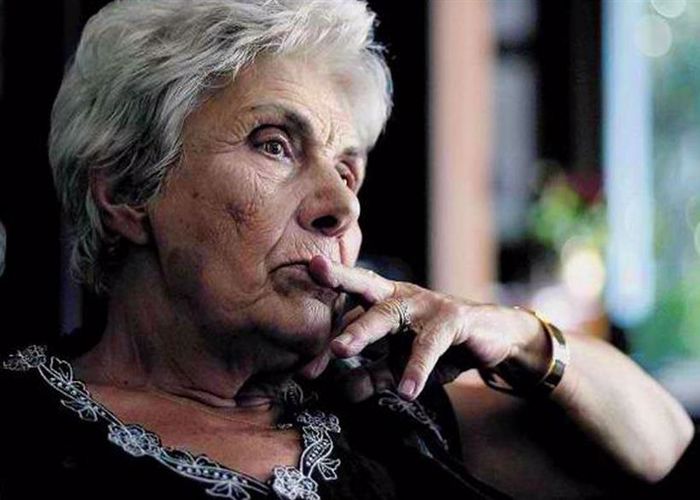
Kiki Dimoula was an academic, mother of two children, and a poet out of necessity because, as she used to say, she ‘had no other way to be’.
If there was one contemporary poet who was absolutely loved by everyone, it was definitely Kiki Dimoula. She wrote about the small everyday moments, about the loss and love, about the need that every woman has to imagine another life and another way of expression.
"I was curious and studious. I know everything. Few out of many. The names of the flowers when they wither, when the words turn green, and when we get cold. How easy it is to turn the lock of feelings with any key of oblivion "wrote Kiki Dimoula with the well-known subcutaneous irony that was her own way to defend herself against anything forced and imposed.
She had known her from an early age when she needed to hide her poems from the conservative environment and claim her own poetic voice in the shadow of her husband who was the well-known and acclaimed poet Athos Dimoulas. She got married at a very young age, after a brief acquaintance with him, who lived two blocks below her house in Kypseli.
When she finished school, Kiki Dimoula worked as an employee at the Bank of Greece - which is why, as she herself stated, she was deprived of the free life of the students, the outings, and the relaxed entertainment. But she had poetry as her eternal consolation, to which she was devoted from a young age.
She even dared to publish at a very young age, only in 1952 the collection "Poems" which she then renounced - and it took two decades to make the dynamic return with the much-discussed and awarded the State Poetry Prize "The little of the world" just in the early ‘70s. It was a collection that was loved and praised by the critics.
For her, however, the day always leaned forward, because she lived in mourning and loss since her husband passed away only in 1985. Always devoted to him, he dedicated a series of poems and verses inspired by the emptiness of love.
Ikaros publications in a statement issued on the occasion of her death said that it was a precondition for their cooperation in 1998 - since then all her poems were published by Ikaros - her poems to be published together with those of her husband.
In 2013, the New York Times wrote a huge text dedicated to the Greek poet who wanted her to be the next Nobel Prize winner: her poems had already been published in English and all foreigners were talking about the Greek successor of Seferis or Elytis. The Nobel was not awarded in the end, but Dimoula had established herself as the Greek poet who crossed the border. She had already won top titles from her country, including the Golden Cross of the Order of Honor and the Excellence in Letters of the Academy of Athens in 2001.
Kiki Dimoula never stopped loving and glorifying poetry, a love that she conveyed to the world that did not stop reading and honoring her poems.
Margarita Karapanou
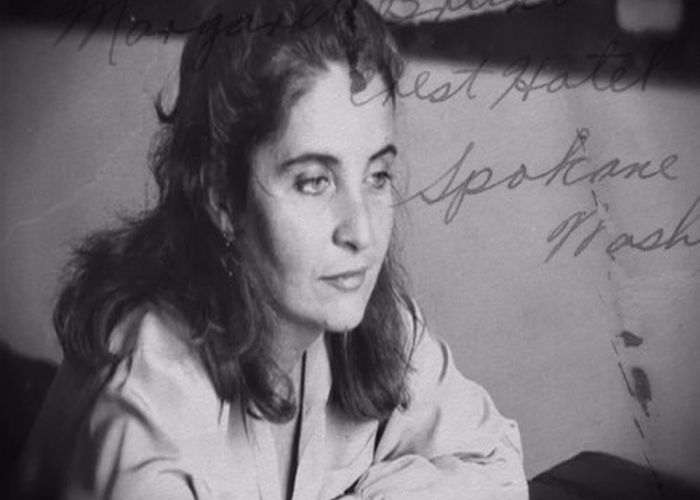
Margarita Karapanou was born in Athens, the daughter of the novelist Margarita Lymperaki and the poet George Karapanou. She grew up in Greece and France and studied cinema in Paris. She worked as a kindergarten teacher in Athens. Her books "Cassandra and the Wolf", "The Sleepwalker" and "Rien ne va plus" were published in Greece, the USA, England, France, Sweden, Israel, Germany, the Netherlands, and Italy.
Excerpts from her work have been compiled into books and major literary magazines alongside texts by Lewis Carroll, Jane Bowles, Anais Nin, John Fowles, Peter Hadke, Carlos Fuentes, Milan Kundera, and others.
In 1988, her novel "The Sleepwalker" was honored in France with the Best Foreign Novel Award. This was followed by her books "Yes", "Lee and Lou", "Mom", "Is It?" (conversations with Fotini Tsalikoglou) and her diaries entitled "Life is wildly unlikely", in 2008, which she kept from the age of 13 to 33.
She died after a short hospitalization in the intensive care unit of the General State Hospital of Athens, on Tuesday, December 2, 2008, at the age of 62, after complications in her health from respiratory problems.
Kostis Palamas
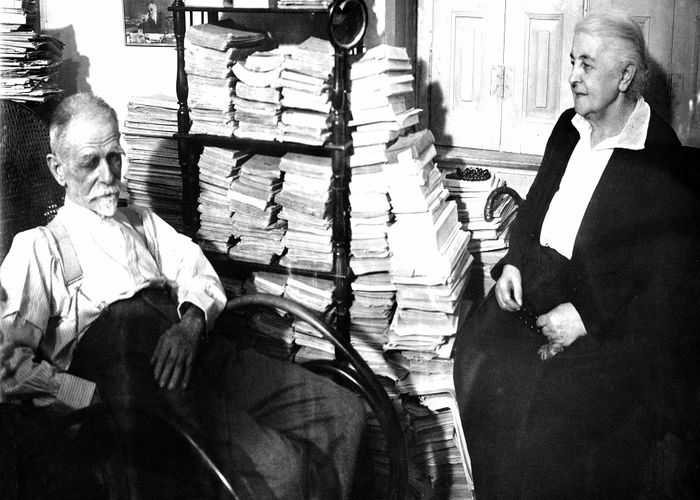
Kostis Palamas was a poet, novelist, playwright, historian, journalist, and literary critic. Palamas is one of the most important Greek poets with a significant contribution to the development of modern Greek poetry.
He was the central figure of the so-called "New Athenian School". He has published a total of 40 poetry collections, as well as plays, critical and historical essays, comparative studies, and book reviews.
Palamas was born on January 13, 1859, in Patras and was originally from Messolonghi. At the age of six, he lost his parents. After the death of his parents, the poet and his brothers went to live in Messolonghi. He lived there from 1867 until 1875.
As soon as he completed his student obligations, he went to Athens to study at the Law School. Soon, however, he left his studies, determined to pursue poetry.
From 1875 he published various of his poems in newspapers and magazines. In 1886 his first collection of poems was published under the title "Songs of my Homeland" in the vernacular.
Palamas wrote the lyrics of the Anthem of the Olympic Games in 1896.
His poetic work is great and with a huge impact. Some of his most famous poems are the following: "Iambos and the Invincible" (1897), "The Incompetent Life" (1904), "The Twelve Gypsies" (1907) and "The King's Flute" (1910).
In 1918 he was awarded the National Excellence in Letters and Arts, while from 1926 he was a key member of the Academy of Athens, of which he became president in 1930.
In 1897 he was appointed secretary at the University of Athens. He remained in this position until 1928.
Palamas "passed away" on February 27, 1943, during World War II and the German occupation. His funeral was an important event of the time. A popular pilgrimage took place and in front of surprised German conquerors, thousands of people accompanied him to his last residence, in the 1st cemetery of Athens, chanting the national anthem.
Menelaos Lountemis
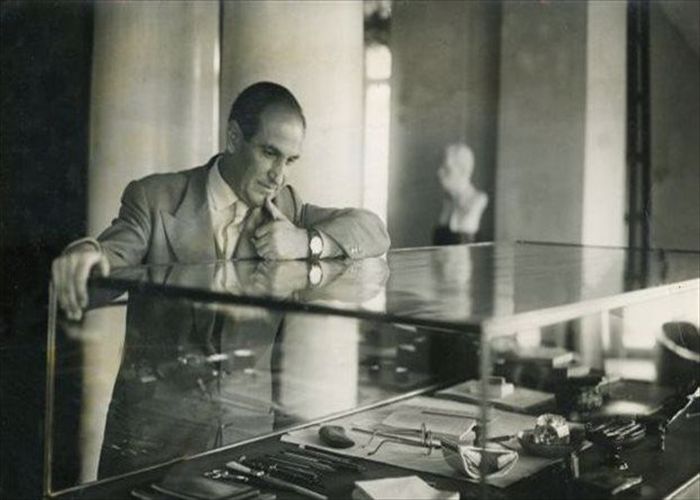
Menelaos Lountemis was born in Istanbul. His real name was Dimitris Valasiadis, and he came from a wealthy family in Polis that went bankrupt after settling in the Greek state. As a child, he lived for a while in the state boarding school of Edessa but soon got various different jobs.
He took part in the National Resistance and joined the EAM, where he was also the secretary of the organization of intellectuals. During the civil war, he was exiled to Makronisos and Ai Stratis, and in 1958 he went on trial for his book Vourkomenes days.
From 1958 until the 1974 coup, he lived in self-exile in Romania, while during Papadopoulos's dictatorship, he was deprived of Greek citizenship. He died in Athens while driving, of a heart attack.
He made his first appearance in literature around 1930 with the publication of poems and short stories in the magazine Nea Estia. In 1938 he published the collection of short stories The Ships did not land, for which he was honored with the Grand State Prize for Prose. He was also honored with the Golden Laurel of Europe (Paris, 1951).
The whole of his work covers almost all types of written language, from prose, poetry, essay, theater, and children's literature, to translation and more.
Menelaos Lountemis belongs to the Greek writers of the interwar period who turned to social realism. The peculiarity of his work lies in the "amateur" way of writing, which he served in full consciousness, as he claimed that he was not interested in Art but in the recording of reality and the demonstration of social inequality.
Nevertheless, throughout his work, he tends to focus entirely on a central narrator (usually referring to the author himself), who belongs to the marginal types of the socially oppressed and who gives us his personal perspective of loneliness, unfulfilled love, and the misery of the world. His work is strongly influenced by the European literature of the current of socialist realism, such as the realistic depiction of landscapes and persons with a strong sentimentality that sometimes touches on melodramatics, experiential writing, and ethnography data.
In his works such as Cloudy and A Child Counts the Stars, his psychographic technique that creates complete, living characters, which make up an entire small society, and the narrative power are remarkable.
Final Thoughts
The Greek language has such a rich and fascinating range of means of expression, words, and ways to describe the beauty and concerns of the world through the art of poetry and literature. Although Greece is a relatively small country, its literary production has been very large, rich, and interesting since antiquity.
Poetry, which as a word was born in Greece, and shone in this country for centuries, continues to this day to feed the world and to be fed by it with small and bigger diamonds.
Frequently Asked Questions
Who are some famous Greek modern writers?
What are the key characteristics of Greek modern literature?
Which Greek modern literary works are considered masterpieces?
How has Greek modern literature influenced world literature?
Are English translations available for Greek modern literary works?
